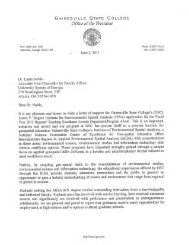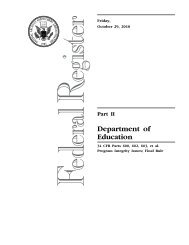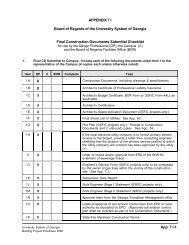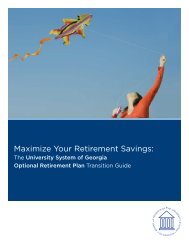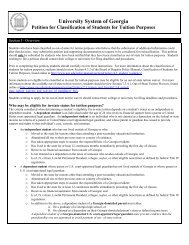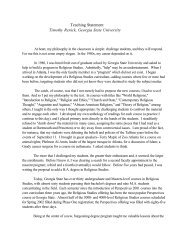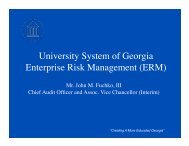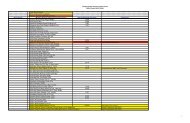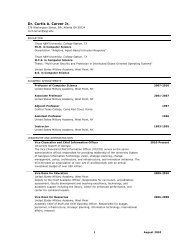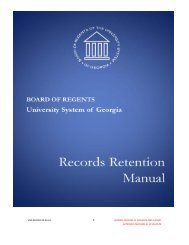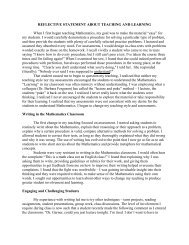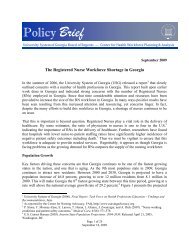University System of Georgia's African American Male Initiative
University System of Georgia's African American Male Initiative
University System of Georgia's African American Male Initiative
Create successful ePaper yourself
Turn your PDF publications into a flip-book with our unique Google optimized e-Paper software.
AAMI is Yielding<br />
Marking its six-year milestone, the <strong>University</strong> <strong>System</strong><br />
<strong>of</strong> Georgia’s <strong>African</strong>-<strong>American</strong> <strong>Male</strong> <strong>Initiative</strong> (AAMI)<br />
was launched in the summer <strong>of</strong> 2002 as a research and<br />
marketing project aimed at identifying the barriers to<br />
college attendance by <strong>African</strong>-<strong>American</strong> males within the<br />
<strong>University</strong> <strong>System</strong> <strong>of</strong> Georgia (USG). With the assistance<br />
<strong>of</strong> external researchers and a 52-member task force<br />
comprised <strong>of</strong> academics, educators, civic and business<br />
leaders from across the state and nation, extensive quantitative<br />
research and qualitative analysis was submitted to<br />
the Board <strong>of</strong> Regents <strong>of</strong> the <strong>University</strong> <strong>System</strong> <strong>of</strong> Georgia<br />
in May 2003. (See report at http://www.usg.edu/aami)<br />
As a result <strong>of</strong> this study, the Board <strong>of</strong> Regents committed<br />
to funding several pilot projects targeting the challenges<br />
and recommendations identified in the report.<br />
From 2003 through 2008, the <strong>University</strong> <strong>System</strong> <strong>of</strong><br />
Georgia has invested nearly $625,000 in AAMI pilot<br />
programs that have served black male middle-school,<br />
high-school and college students throughout Georgia.<br />
In addition, many institutions within the USG<br />
implemented self-funded efforts in<br />
support <strong>of</strong> AAMI’s goals.<br />
In July 2002, three known<br />
programs in the USG focused<br />
on improving educational<br />
outcomes for <strong>African</strong>-<strong>American</strong><br />
males.<br />
Presently, more than 19 USG<br />
institutions are operating<br />
25 different AAMI programs<br />
focusing on the K-12<br />
pipeline,college retention<br />
and student life issues.<br />
AAMI is yielding<br />
results. Between fall<br />
2002 and 2007,<br />
<strong>African</strong>-<strong>American</strong><br />
male enrollment<br />
in USG institutions<br />
has increased<br />
Results<br />
from 17,068 to 21,249 — an increase <strong>of</strong> 24.5 percent.<br />
From fall 2006 to fall 2007 alone, <strong>African</strong>-<strong>American</strong> male<br />
enrollment increased by 7.4 percent — the largest ever<br />
single-year percentage increase — resulting in 1,465 new<br />
<strong>African</strong>-<strong>American</strong> male students enrolled in USG colleges<br />
and universities.<br />
Since the program’s inception, the gap also has closed<br />
between <strong>African</strong>-<strong>American</strong> male and <strong>African</strong>-<strong>American</strong><br />
female annual enrollment growth within the USG. In fall<br />
2002, black female enrollment growth increased 9.5<br />
percent over the previous fall, compared to an enrollment<br />
growth <strong>of</strong> 7.2 percent for black males for the period.<br />
By fall 2004, the black female enrollment growth was 2.8<br />
percent, nearly on par with the black male percentage<br />
increase <strong>of</strong> 2.9 for black males. In fall 2005, black male<br />
enrollment growth <strong>of</strong> 3.1 percent nearly tripled that <strong>of</strong><br />
the black female enrollment increase <strong>of</strong> 1.4 percent.<br />
That closing <strong>of</strong> the gap continued in fall 2007, when the<br />
black female increase was 4.4 percent compared to the<br />
black male increase <strong>of</strong> 7.4 percent — significantly<br />
reversing the negative trend.<br />
The USG’s AAMI efforts also have garnered significant<br />
attention, including inquiries from other academic<br />
entities, presentations at national conferences, as well<br />
as statewide and national media coverage. This attention<br />
positions the <strong>University</strong> <strong>System</strong> <strong>of</strong> Georgia’s work<br />
in improving educational outcomes for black males as a<br />
national model.<br />
In July 2006, AAMI was awarded a two-year, $100,000<br />
grant from the Lumina Foundation for Education’s<br />
McCabe Fund. Those funds supported AAMI programs<br />
at three USG institutions and a graduate student in the<br />
<strong>University</strong> <strong>System</strong> <strong>of</strong> Georgia’s Office <strong>of</strong> Strategic<br />
Research and Policy Analysis.<br />
In August 2007, AAMI hired its first full-time employee,<br />
Ms. Betsy Green. She serves as assistant project director,<br />
supporting Arlethia Perry-Johnson, who continues<br />
to serve as project director.<br />
AAMI convened its first-ever <strong>University</strong><br />
<strong>System</strong>-wide “AAMI Best Practices<br />
Conference” in November 2007 on<br />
Kennesaw State <strong>University</strong>’s campus.<br />
Nearly 300 adult and youth<br />
participants and supporters <strong>of</strong> the<br />
USG’s various AAMI efforts convened<br />
at an invitational event to share<br />
information with their peers and to<br />
hear from nationally recognized<br />
leaders doing work in this field.<br />
In spring 2008, a Request for<br />
Proposals process was conducted<br />
within the USG to select 2008<br />
summer and 2008-2009 academic-year<br />
AAMI initiatives. As a result, $200,000<br />
was awarded to 11 USG institutions in<br />
the fourth round <strong>of</strong> AAMI pilot-grant<br />
funding.<br />
AAMI <strong>of</strong>ficials also are working<br />
collaboratively with Board <strong>of</strong><br />
Regents and GACollege411<br />
<strong>of</strong>ficials to build a collaborative<br />
website aimed at young black males,<br />
designed to provide them and<br />
their parents targeted information<br />
regarding the path to college<br />
admission, standardized test<br />
preparation and financial aid.<br />
The website will be supported by<br />
a state-wide radio and television<br />
marketing campaign called<br />
“Million Dollar Player,” designed to<br />
communicate that college graduates<br />
earn $1 million more in income over<br />
their lifetimes than high-school<br />
graduates. The website,<br />
www.aami-mdp.usg.edu, will be<br />
launched in fall 2008.<br />
4 5



